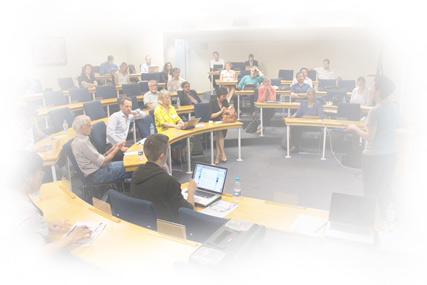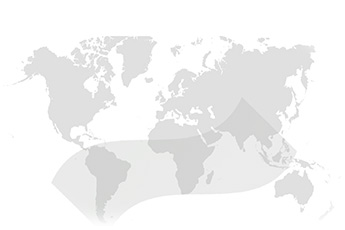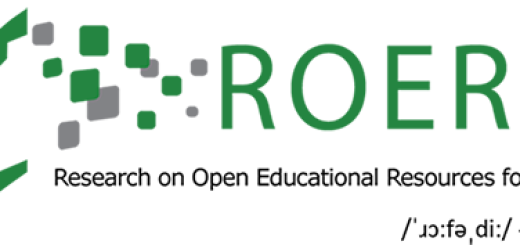Dr Glenda Cox (right) with her supervisor, A/Prof Cheryl Hodgkinson-Williams on her graduation day (Photo credit Glenda Cox).
Sukaina Walji, ROER4D Communications Advisor spoke to Dr Glenda Cox, Senior Lecturer at the Centre for Innovation in Teaching and Learning, at the University of Cape Town (UCT) about her recently submitted PhD thesis ‘Explaining the relations between culture, structure and agency in lecturers’ contribution and non-contribution to Open Educational Resources in a Higher Education Institution’. Glenda is also the Lead Researcher for ROER4D Sub-project 4. This blog post considers how this research sheds light on why academics choose or choose not to share open educational resources, which has important implications for the future sustainability of the OER movement.
As the OER movement enters its second decade, the question of what motivates academics to contribute and share OER is an increasingly pertinent one. Many factors are considered as drivers for lecturers and academics to share their teaching materials. These might include structural factors such as the presence or lack of an intellectual property (IP) policy that enables academics to share and create OER, or the availability of an institutional or public repository to share materials to. Additionally, cultural factors would include the management style of a university that motivates and encourages academics to share (or conversely discourages and creates barriers).
For the past six years, Glenda has worked with academics to encourage and support them to contribute OER to UCT’s institutional repository. he has also been overseeing the awarding of OER grants to staff applicants. This has led to conversations with academics about their views and actions towards sharing their teaching materials in the repository.
Glenda was inspired to pursue her PhD as she was curious to explain academics’ behaviour and attitudes to sharing OER in a context where, even though various enabling factors seem to be in place only some academics share and contribute while many others do not. Is it possible to differentiate between those who do contribute and those who do not? Is it possible to explain causally why some academics choose to share and others do not, even where the institutional enablers are in place?
In our conversation, Glenda explained that at UCT, academics are enabled to share their teaching materials. Structural enabling factors include an IP policy that (unusual to South African universities) allows academics to share their materials, the presence of a repository to deposit materials, and the availability of support such as workshops on Creative Commons and staff at the Centre for Innovation in Learning and Teaching and in the Library to assist. The culture at UCT is one which emphasises academics’ freedom of choice in that there is no compulsion on one hand to share or not to share, nor are there incentives to do so on the other hand. This results in a situation where it is the the academics themselves that hold the power of action. However, this question of why academics choose to exercise that agency has been under-researched and under-theorised, a fact which Glenda hopes her research has remedied to an extent with her research contribution.
Theoretical framework and methodology
Glenda’s research sought to address this gap by drawing inspiration from a paper written by Cheryl Hodgkinson-Williams & Eve Gray[1] which explored the use of social realism and the idea of academics’ “ultimate concerns”. These are “those internal goods that [people]care most about”, and where addressing this concern can result in projects and establishing of practices. In thinking about her own research, Glenda believed this might be a way to conceptualise why academics do or do not share their teaching materials openly.
Social realism posits that society has three aspects: culture, structure and agency, and this has proved useful in framing Glenda’s thesis. In reading the works of Margaret Archer more deeply, Glenda was drawn to her concept of “internal conversations” which acted as a mechanism through which Glenda could investigate how academics made choices about why they do something through “listening in” to their internal conversations through interviews and questionnaires (which Archer designed herself to capture these internal conversations). Analysing these according to Archer’s criteria allowed Glenda to sort academics into different “types”, and a remarkable pattern emerged.
Findings
Glenda’s study ‘Explaining the relations between culture, structure and agency in lecturers’ contribution and non-contribution to Open Educational Resources in a Higher Education Institution’ revealed that OER contributors were “Autonomous Reflexives” (ARs) while the non-contributors were “Meta-reflexives” (MRs). ARs tended to be ambitious, multi-taskers, competent teachers and researchers, thus sharing teaching materials could be explained as being part of their ultimate concerns. For them, sharing OER made sense with whatever else they were doing. MRs were “typical academics”, who despite being brilliant teachers, tend to be highly self-critical and concerned about quality, and thus did not see sharing as part of their ultimate concerns. This held them back from contributing. This helped Glenda to understand why in a collegial institutional culture where people have such strong feelings about personal autonomy and choice, a top-down policy mandate requiring OER contribution would likely not be successful, given the the belief in academic autonomy in this culture.
While Glenda’s sample is relatively small – comprising 14 lecturers across UCT’s seven faculties- the clear pattern emerging was interesting and surprising. Other pertinent issues around contribution included concerns around beliefs of OER quality and their willingness or not to contribute OER. For some lecturers, quality is related to pedagogical value: will the pedagogy of the resource be improved through sharing? Others were concerned about technical issues and formats of the OER (such as writing styles and file formats). The contributors in this study were less worried about quality than the non-contributors; while the contributors were sometimes concerned about their reputation. they still felt it was the right thing to do as sharing OER met their ultimate concern.
Implications of the research
Glenda’s research has shone a theoretical light into an area that goes to the heart of OER sustainability. As Glenda writes in her thesis, “the long term sustainability of the OER movement rests firmly on the willingness of individual lecturers to share and use OER”, and many OER practitioners and researchers have been puzzled about why some academics share and others are reluctant. While barriers and enablers scaffold and increase the potential for academics to share, it is ultimately individual agency that appears to be the main driver.
In asking Glenda what could be done at UCT to encourage sharing, she mentioned that while the institutional culture militates against any move to mandate contribution, encouraging academics to see it as part of their ultimate concerns may be feasible. For example, she suggested that OER contribution could be included in the reporting process on, for example, Human Resource forms. Academics could be asked if they have contributed OER as part of their social responsiveness activities. This, Glenda considers, might encourage more academics to contribute and share.
This research will be of interest to other institutions which have a similar profile – that of a research intensive university with a collegial culture – and it will also have resonance for OER practitioners and researchers who work with and are encouraging academics to contribute OER.
References
[1] Hodgkinson-Williams, C. A. & Gray, E. (2008). Paradox, promise and problem: A Social realist view of the potential of open educational resources at the University of Cape Town. Proceedings of the 3rd International Conference on e-Learning. University of Cape Town, 26-27 June 2008.





